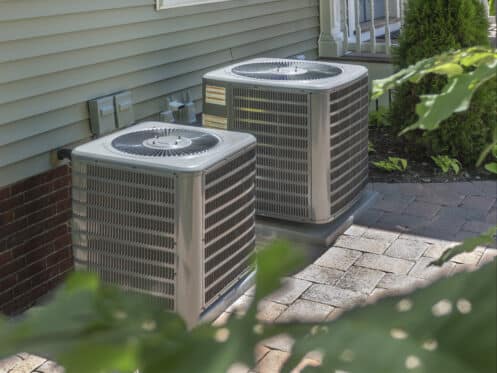When the outside temperature dips or soars or when humidity levels are at an all-time high, you need the HVAC equipment in your Lubbock, TX home to maintain safe and habitable conditions. Fortunately, the underlying causes of most HVAC problems are often quite simple. The following are six possible reasons why you aren’t getting reliable and efficient HVAC performance.
1. Your Heating or Cooling Equipment Is the Wrong Size
If your heater, air conditioner, or heat pump is relatively new and has consistently underperformed since installation, it could be the wrong size for its service area. For instance, oversize furnaces and ACs tend to have ultra-short heating and cooling cycles. They turn on and then rapidly cycle off after just three to five minutes of operation. Conversely, units that are too small for their service areas run nearly all of the time and rarely accomplish their goals.
We use the Manual J Load Calculation when sizing new HVAC equipment. This accounts for ceiling heights, building layouts, the number of household residents, and more. It ensures accurate HVAC sizing and superior performance.
2. You Have a Dirty HVAC Air Filter
Dirty HVAC air filters handily rank among the top causes of poor HVAC performance. All of the air that enters your HVAC system must pass through this component. When it’s covered in heavy build-ups of dirt, dust, and grime, airflow suffers. A dirty air filter can cause:
- Poor indoor air quality (IAQ)
- Increased humidity
- Musty odors
- Dirty air registers, grilles, and vents
Running your heater or AC with a dirty filter can also lead to overheating, short cycling, higher-than-normal energy bills, and a complete shutdown.
To prevent filter-related problems, check your filter once each month. You can assess its remaining lifespan by simply holding it up to the overhead light. If light can still pass through a filter’s mesh, the air that enters your HVAC system can move through it, too. The recommended schedule for HVAC air filter changes is once every 30 to 90 days as needed.
3. It’s Time for Preventative Maintenance
All HVAC equipment types need annual maintenance service. Homeowners should have a furnace tune-up in late fall and an air conditioner tune-up in late spring. If you have a heat pump and use it year-round, you should have it tuned-up before winter and again before summer arrives.
During preventative maintenance service, we:
- Check for and replace damaged or worn parts
- Remove airflow obstructions
- Test failsafe measures
- Calibrate thermostats
- Inspect and clear furnace venting systems
We also thoroughly clean HVAC equipment inside and out. These measures prevent problems like overheating, inefficient performance, poor humidity control, clogged condensate drains, and more.
4. Your Ductwork Is Damaged or Dirty
Just like HVAC air filters, dirty ductwork inhibits airflow. Sometimes, HVAC ducting is infested by rodents or other small animals that leave behind food, feces, and other waste. Your air ducts might be dirty if you regularly forget to replace your HVAC air filter. Many things diminish ductwork’s integrity, including heavy, fast-moving pests, falling items in areas where ducting is exposed, and age-related wear, such as sagging and separation.
During annual heater and AC maintenance, our technicians inspect ducting for airflow problems and leaks. However, you should additionally schedule comprehensive ductwork maintenance at least once each year. According to the National Air Duct Cleaners Association (NADCA), it’s also a good idea to schedule professional air duct cleaning every two to three years.
5. Someone Fully Closed One or More HVAC Air Vents
Residents shouldn’t close HVAC air vents to direct unwanted conditioned air away from them. Closed vents cause an increase in static pressure within HVAC ducting. Increased pressure places stress on furnaces and air conditioners and could cause them to short cycle or overheat. For customized delivery of heated and cooled air, it’s best to have your central HVAC zoned. To optimize vent positions following major adjustments and closures, schedule professional air balancing services.
6. Your Thermostat Isn’t Set Correctly
If your air conditioner or heater won’t turn on or if your HVAC system is running but blowing out room temperature air, you should check your thermostat. People frequently toggle their thermostat fan settings to the “ON” position rather than “AUTO.” On “AUTO,” your HVAC blower fan will only engage during heating and cooling cycles to distribute conditioned air. When the selected fan setting is “ON,” the system fan will run non-stop and regularly blow room-temperature air.
We’re proud to serve Lubbock, TX and the surrounding cities. Our clients can count on us for expert heating, cooling, plumbing, and septic services. If your HVAC system isn’t working like it should give Action Air Plumbing and Septic a call now!



